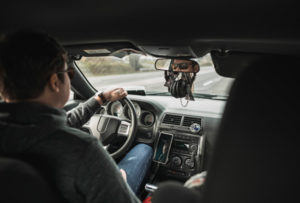NY ‘black car’ operators adding illegal surcharge on tips, claims lawsuit
 Drivers for Uber, Lyft and other “black car” services in New York State are tacking on a 2.5 percent surcharge on tips, according to a class action lawsuit filed in federal court arguing the assessment is illegal.
Drivers for Uber, Lyft and other “black car” services in New York State are tacking on a 2.5 percent surcharge on tips, according to a class action lawsuit filed in federal court arguing the assessment is illegal.
Joseph Kasiotis, a Bronxville resident who describes himself as a frequent user of livery services, is accusing the Black Car Fund of unjust enrichment.
“New York consumers are being unlawfully ”˜taxed,”™” his complaint stated, “when black car companies impose and collect a mandatory surcharge intended to be calculated on the fare only.”
The lawsuit was initially filed in Westchester Supreme Court and then removed by the Black Car Fund to White Plains federal court on Aug. 1.
The Fund, formally known as the New York Black Car Operators”™ Injury Compensation Fund Inc., denied Kasiotis”™ claims and denied that passengers are entitled to relief.
The state legislature created the Fund in 1999 to provide workers’ compensation benefits to limousine drivers.
The law mandates that for-hire car services that provide most of their rides through contracts and credit cards, and which own no more than half of their cars, join the Fund.
The Fund, a nonprofit organization headquartered on Wall Street, represents about 300 members with more than 70,000 drivers.
Members are required to apply a 2.5 percent surcharge on every trip that originates in the state in order to fund workers’ compensation benefits.
“The 2.5 percent surcharge is paid for by the passenger,” according to the Fund”™s website, “as a part of their full fare.”
Kasiotis claimed that drivers are also applying the assessment to tips that are paid for with credit cards.
The surcharge is required only on payments for “covered services” picking up and dropping off passengers, the complaint stated.
“The very essence of a gratuity is its voluntary nature, unmoored from any legal obligation to make such a payment,” the complaint said. “Indeed, by definition, a gratuity is an expression of appreciation to the driver personally, not payment for the fare.”
Kasiotis attributed the tip surcharge to the growth of ride-hailing services such as Uber, Lyft and Via. Until recently, Uber did not allow drivers to charge or accept tips.
Now Uber policy assures customers, “Tips go directly to drivers; Uber does not charge additional service fees on tips.”
The growth of ride-hailing services such as Uber increased the number of daily transactions exponentially, the complaint stated, creating a “perverse incentive” to impose the surcharge on non-cash tips and generating an “enormous windfall” for the Fund.
Kasiotis is asking the court to stop Fund members from imposing a tip surcharge.
In removing the case to federal court, the Fund”™s attorney said that there is a “reasonable probability” that the amount in controversy will exceed the $5 million threshold for a class action lawsuit.
The Fund is represented by Bradley J. Nash of Schlam Stone & Dolan in Manhattan.
Kasiotis is represented by Jeffrey I. Carton, Robert J. Berg and Myles K. Bartley of Denlea & Carton in White Plains.